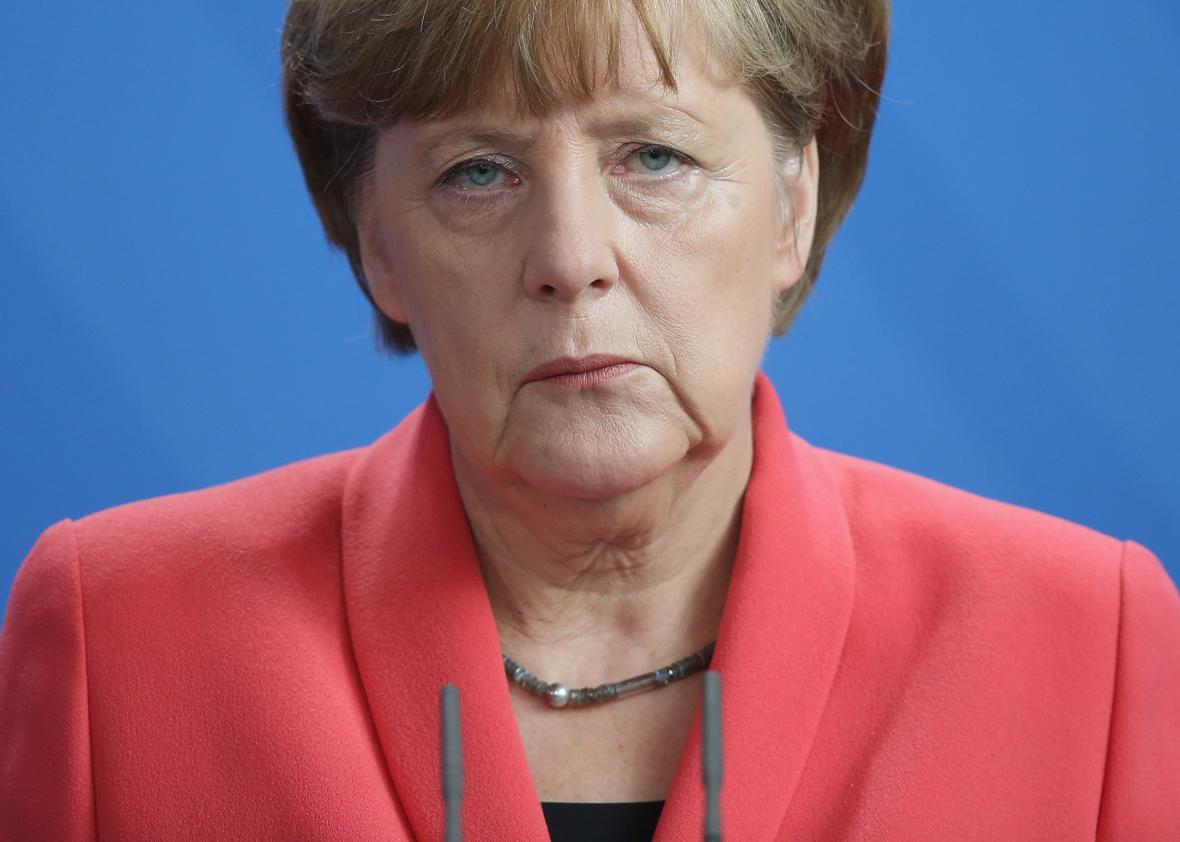When I first read that German officials were going to suggest the idea of letting Greece take a temporary “timeout” from the eurozone in lieu of a new bailout, I both laughed and cringed. First, because “timeout” is the actual English phrase they settled on, as though they were discussing how to punish a rambunctious toddler. Second, because the plan sounds absurd on its face.
Incredibly, a “timeout” might just end up being Greece’s fate, so we might as well dissect the idea a bit. In a draft document that circulated during this weekend’s bailout talks, the Eurogroup, upon Germany’s prompting, suggested that “in case no agreement could be reached, Greece should be offered swift negotiations on a time-out from the euro area, with possible debt restructuring.” In a very short white paper outlining the idea, meanwhile, Berlin’s finance ministry suggested the suspension could last five years, essentially while Greece got its fiscal act together with the help of “humanitarian aid” from the rest of Europe.
It’s basically the Richard Burton–Liz Taylor approach to economic unions: Get divorced, then get hitched again.
France, the second most important player in these negotiations, behind Germany, seems to think this is all idiotic. “There is no provisional Grexit,” President François Hollande told reporters. “There is Grexit or no Grexit. Greece is in the eurozone or Greece is not in the eurozone.” Austria’s chancellor chimed in that the plan was “demeaning and wrong.” An unnamed but usefully blunt EU official derided it as “legally unfeasible and not serious.”
Greek Prime Minister Alexis Tsipras reportedly isn’t even taking the idea seriously. And it’s not hard to figure out why he, particularly, would object. By almost any objective standard, the deep structural flaws in Europe’s monetary union have been an utter disaster in Greece. In an ideal world, the country would never have joined the eurozone at all. But it clings on now largely because the potential consequences of leaving are so terrifying. Signing back up for euro membership after weathering the storm of an exit would be insane and pointless.
And yet, given the dead end these talks seem to be headed towards, a timeout might not be the worst of all possible compromises.
As of now, Greece’s chances of staying in the eurozone as a normal member seem to be slipping away. Despite the fact that Tsipras capitulated on nearly all of their major demands in his most recent request for a bailout, Europe’s leaders are apparently unsure they can trust the government in Athens to carry out all of the tough reforms it has promised. So they have given Greece three days to pass a tough round of austerity policies into law. Only then will they even consider negotiating the specifics of a new rescue package.
Beyond that, because the last couple weeks of economic paralysis in Greece have increased the cost of a bailout, the Euroroup now wants a bigger pound of flesh in return for its money. A draft document circulated during this weekend’s talks suggested that Greece would be forced to accept humiliating international monitoring, for instance, and may have to fork over €50 billion of state assets, which would eventually be privatized in order to pay down some of its debt.
Given that Greek voters just gleefully shot down a comparatively lax bailout package in a national referendum, it seems unlikely that Tsipras would be able to sell such a deal back home, even if he wanted to. Germany’s leaders, including Chancellor Angela Merkel and Finance Minister Wolfgang Schäuble, almost certainly know this. Yet they’ve loaded their draft offer with enough poison pills to kill off a blue whale. Why?
Because they pretty clearly want Greece out of the eurozone. They might see it as punishment for whatever fiscal sins Athens committed in the past, or for the current government’s intransigence. But Germany also seems to believe that all parties would really be better off with a separation. Schäuble has said he does not think Greece’s current debt load is sustainable, but that giving the country outright loan relief—or a “haircut”—would violate European Union rules. The timeout might be an end run around those restrictions. The finance ministry’s white paper hints as much: “Only this way forward could allow for sufficient debt restructuring, which would not be in line with membership in a monetary union.”
A timeout might also solve a tricky political problem. Under current law, it’s not clear that Greece can leave the euro without also leaving the European Union altogether. And in Germany’s eyes, the biggest downside to a Grexit is that it would show the world that European unification can be reversed. However, a timeout from the currency, according to the white paper, would let Greece stay an EU member, thus assuaging those concerns.
So that’s why a timeout would work from Germany’s perspective. But why would Greece agree to any of this? Presumably, the fallout from a negotiated timeout would be a lot less chaotic than a hasty, unplanned exit, especially if it got to remain part of the EU’s free-trade pacts. Now, though it’s a bit vague, the Eurogroup’s draft proposal seems to suggest that the Greeks would only be eligible for suspended eurozone membership if they first pass the severe austerity agenda their creditors have asked for, which makes it less appealing and means it might never end up on the table. But if Europe could offer a timeout without the burdensome preconditions, it might work.
Of course, it’s entirely possible that Greece would agree to a short-term suspension from the euro only to ditch the euro for good once it found its economic footing. Which is sort of the beauty of the whole plan, anyway. It would delay the final decision, and maybe soften its repercussions. Plus, if there’s anything these last few weeks have taught us, it’s that Europe loves to stall.
